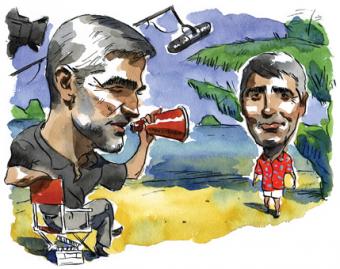Hollywood’s leading actor shines in roles that show success doesn’t always bring happiness.
My seventh-grade English teacher once asserted that although the word gorgeous usually referred to women, some men were drop-dead gorgeous. I knew from other comments that she was thinking about Cary Grant in that moment. For more than a decade many moviegoers have pictured George Clooney when that expression comes up.
Indeed, Clooney may be the closest thing we have to Hollywood royalty these days, a star of dazzling beauty with impressive acting chops and a penchant for producing movies that make tons of money and earn buckets of critical praise. On the surface, Clooney the Hollywood star is a person who has it all: good looks, charm, fame, fortune, and a long string of box office successes. With the near complete absence of public scandals, squabbles, divorces, or drunken brawls that seem to shadow the lives of most celebrities, one gets the impression Clooney is living the life Cary Grant used to play in the movies.
Which is why it is interesting that this generation’s Cary Grant should so often seek out roles and characters haunted by an aching loneliness and alienation. Of course actors grow tired of playing to type, and Clooney, as Grant did, likes to mug it up in screwball comedies like One Fine Day, Intolerable Cruelty, and Leatherheads, or dabble in farces like O Brother, Where Art Thou?, Burn After Reading, or The Men Who Stare at Goats. The star who dazzles in a tuxedo has shown again and again that he can leave us in stitches with his manic slapstick routines.
But in five major films in the last six years, Clooney has played profoundly lonely men, alienated characters ill at ease in their own skin and disconnected from their emotional lives and from their home or family. These are roles one might expect a less attractive but highly gifted actor like Paul Giamatti or Philip Seymour Hoffman to take on, not characters we expect Cary Grant to inhabit.
In Syriana an overweight, bearded Clooney plays weary divorced CIA operative Bob Barnes. Caught in a web of personal and professional betrayals, Barnes is a lost, bitter man left out in the cold for far too long, a man without a country, family, or friend.
In Michael Clayton Clooney is an anxious, depressed “fixer” at a corporate law firm, a corporate handler detached from his emotions and ideals who has been sent to silence the troublesome conscience of a friend and colleague.
In Up in the Air Clooney’s character Ryan Bingham spends his life commuting to other cities in order to fire people, a hired gun living in interchangeable hotel rooms and eating repeatable meals. His life is his suitcase, and it is a tiny package indeed.
In The American Clooney plays a cold-blooded hit man on the run, betrayed and abandoned by the people who employed him but incapable of making any real connection with anyone else. If Sartre thought hell was other people, Clooney’s characters suggest that hell is being constitutionally unable to connect with or care about others.
In Clooney’s most recent film, The Descendants, his character, Matt King, is an emotionally detached workaholic. In spite of being a pretty decent guy living in paradise with a beautiful wife and a huge inheritance, King is a deeply unhappy man who seems not to know a single thing about the people around him. Confessing that he is a backup parent, unfamiliar with his children’s interior lives, King soon discovers he is equally clueless about what was going on in his marriage or bed. He learns from his angry daughter that his dying wife was having an affair and planning to leave him.
The dramatic tension in The Descendants comes from the fact that a man who seems to have everything that would make him happy is missing the heart of his life, the emotional connections that make life worthwhile. King has plenty of relatives and a wide circle of acquaintances, but he lacks even one real friend he can turn to in this awful crisis.
And perhaps this is exactly what draws Clooney, the dazzling Hollywood star with fame and fortune at his fingertips, to play King and these other desperately lonely men. Perhaps the tall, dark, and handsome actor who seems to have everything wealth and success can bring a person is fascinated by the idea that real happiness is ultimately about love, friendship, and connection.
Mostly we expect celebrities to remind us of the folly of our shared fantasies of fame and fortune by showing us the shipwreck of their private lives. But Clooney, whose private life remains largely in the background, prefers to explore in his art the hole at the center of the American dream of success. So the star with everything plays men missing the most important thing—a connection to other people—and warns us to pay attention.
Perhaps Clooney is more Orson Welles than Cary Grant, and his serious films explore the same theme that haunted Citizen Kane. Like Clooney’s five lonely men in search of a connection, Charles Foster Kane was a man with everything but love, and Welles clearly intended his masterpiece as a broadside against the vacuous American dream of wealth and success. So, too, Clooney’s characters provide a parable warning us of the dangers of falling in love with the fame and fortune of the high and mighty.
As the Bible says about the first person ever put in paradise, “It is not good that the creature should be alone.”
This article appeared in the February 2012 issue of U.S. Catholic (Vol. 77, No. 2, pages 27-31).
Image: Darren Thompson













Add comment